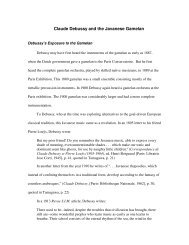Music Preference 1 - Brent Hugh's personal and business web pages
Music Preference 1 - Brent Hugh's personal and business web pages
Music Preference 1 - Brent Hugh's personal and business web pages
You also want an ePaper? Increase the reach of your titles
YUMPU automatically turns print PDFs into web optimized ePapers that Google loves.
School audiences.<br />
<strong>Music</strong> <strong>Preference</strong> 43<br />
The responses from the school groups (LE, UE, MS, <strong>and</strong> HS) were analyzed by age.<br />
Treatment ID increased mean preference ratings of younger students more than those of older<br />
students (see Table 13 <strong>and</strong> Figure 3). However, analysis of the school group data using repeated<br />
measures ANOVA with two-way interaction indicates the age differences among the school<br />
groups do not rise to the level of significance (see Table 12).<br />
Discussion<br />
Recital Audiences. The results support the aging stability model of attitude change for the<br />
type of music preference measured in this study <strong>and</strong> for the recital audiences (group RA). <strong>Music</strong><br />
preference attitudes seem to be more amenable to change for younger subjects <strong>and</strong>, with age,<br />
attitudes become gradually more hardened <strong>and</strong> difficult to influence.<br />
This finding is in contrast to finding of previous research, which suggested that the<br />
impressionable years model of music preference holds in all areas of musical preference. The<br />
impressionable years model clearly does not hold for group RA: Audience members age 21-40<br />
are not set in their preferences; their preference rating rose by 0.26 (6.5%) as a result of the<br />
treatment, which is greater than the mean rise in preference ratings for the community concert<br />
audience as a whole <strong>and</strong> greater than the mean rise in preference ratings for the school groups as<br />
a whole.<br />
The negative response of group RA3 (age 41-60) to treatment ID is perhaps due to the<br />
change the treatment introduces to the usual routine of recitals, which normally include music<br />
only <strong>and</strong> no discussion. This age group may be socialized to expect a kind of classical music<br />
recital that includes music only <strong>and</strong> no other interaction of the audience with the performer <strong>and</strong><br />
may have rather set attitudes about this format. Interestingly, though, data from free-response





